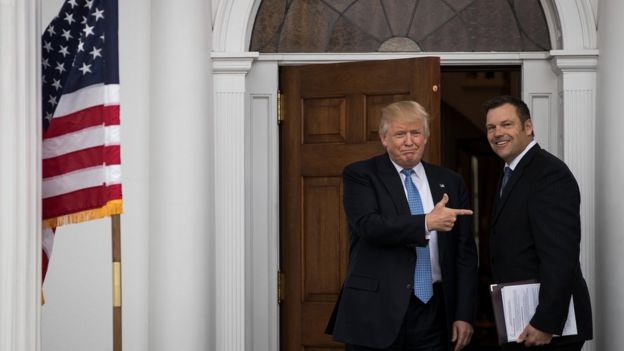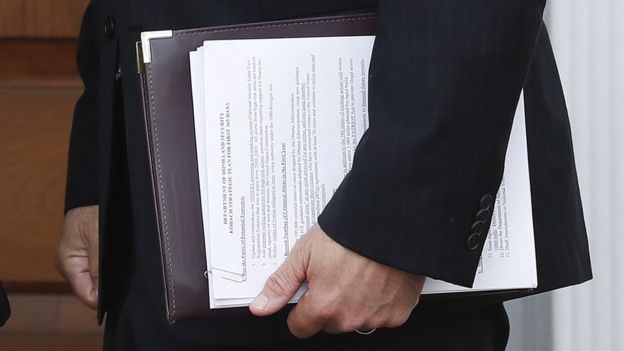
This article is more than
9 year old
He made the announcement in a video messageoutlining what he intends to do first when he takes office in January.
The TPP trade deal was signed by 12 countries which together cover 40% of the world's economy.
The Republican also pledged to reduce "job-killing restrictions" on coal production and stop visa abuses.
But there was no mention of repealing Obamacare or building a wall on the southern border with Mexico, two actions he said during the campaign he would do as soon as he assumed power.
His surprise election win two weeks ago has sparked protests across the US.
The TPP was agreed in 2015 by countries including Japan, Malaysia, Australia, New Zealand, Canada and Mexico, but is not yet ratified.
Its aim was to deepen economic ties and boost growth but its opponents say it was negotiated in secret and it favours big corporations.
"Not a surprise, but his trade policies will undermine the gains that TPP would have brought for the US." Parag Khanna, Centre on Asia and Globalisation
"Very depressing news. It means the end of US leadership on trade and the passing of the baton to Asia." Deborah Elms, Asian Trade Center
"The collapse of the TPP will now create a void in Asia. There is lots of talk about China now moving in to fill it. Harumi Taguchi, economist
What is the TPP and why does it matter?
Asia-Pacific leaders meeting in Peru over the weekend said they will continue to pursue free trade deals despite Mr Trump's opposition.
But on Monday, Japanese Prime Minister Shinzo Abe said the TPP trade deal would be meaningless without the involvement of the US.
President-elect Trump signalling the death of the TPP is a big blow to many parts of emerging Asia. Sure, the other countries could go ahead, as some have signalled, and continue with the deal on their own - but what would be the point without unfettered access to the US market?
Vietnam and Malaysia were set to gain the most from the deal. They already have access to the US markets for their products, but were hoping to see tariffs on some of their key exports vanish altogether.
China could step in with a regional trade deal, also known as the RCEP. But would a Chinese initiated regional trade deal bring the same benefits? Not really, say some analysts - most Asian countries already have preferential access to China's markets under the China-ASEAN free trade agreement of 2010.
But you could see some Asian countries that were due to be excluded from the TPP - like the Philippines, Thailand and South Korea - benefit from the RCEP.
In the video message, Mr Trump said his governing agenda would be based on "putting America first".
The six executive actions he would take on day one are:
The president-elect has spent the last week starting to put together his new team.
The people around Donald Trump
He said in the video that "truly great and talented men and women, patriots are being brought in and many will soon be a part of our government".


Some key appointments have been made, but not without controversy.
Alabama Senator Jeff Sessions, who was turned down as a federal judge in 1986 due to racism complaints, will head the Justice Department.
And the news that Steve Bannon, former editor-in-chief of the conservative Breitbart website, was the new White House strategist was welcomed by former Ku Klux Klan leader David Duke.
One of Trump's immigration advisers, Kris Kobach, was unwittingly photographed meeting him while holding a document on view that contained some hardline proposals.
Among them was the re-introduction of registration for people arriving from mostly Muslim countries, which was brought in after the September 11 attacks but later dropped.